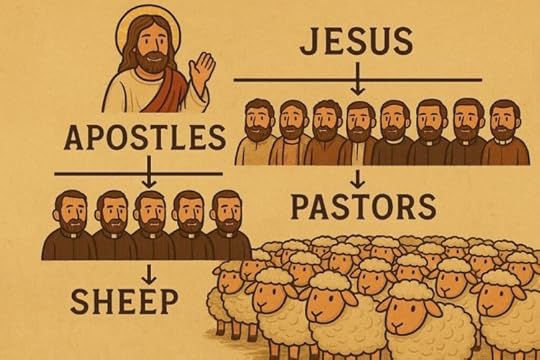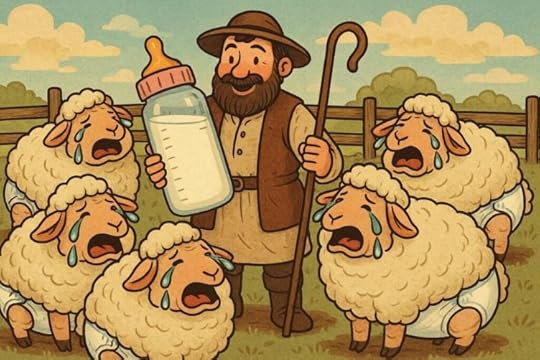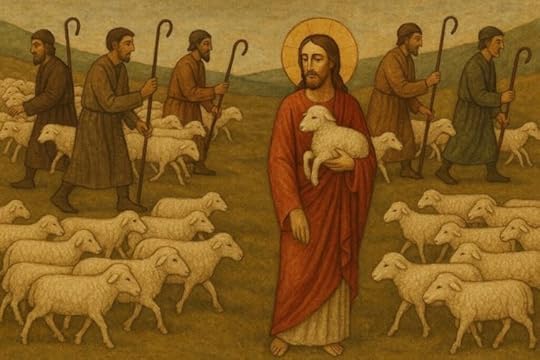What Churchianity Doesn’t Understand About Pastors And The Body of Christ

I’m passionate about Jesus and the gospel message, but I don’t fit in the box of churchianity. Much of what people consider to be “Christianity” today is actually churchianity. It’s based on tradition. Sometimes, those traditions are all right, but not essential. Sometimes, those traditions lead us directly into disobedience to the commands of scripture, just as the Pharisees broke God’s commands for the sake of their tradition.
In my communion with people from many local churches, I often get asked, “What church do you go to?” and “Who is your pastor?” I wrote about these issues last year, but I want to revisit the issue of pastors and my relationship with the body of Christ.
I fully agree about the importance of church leaders and elders, being teachable, being accountable, and being connected to the body of Christ. However, my understanding of what that looks like is so different than what it is in “churchianity” that it’s as if we’re living in different universes. Our thinking is so different that it takes a lot of time and effort to explain, and few in churchianity have the patience or humility to listen rather than just judging by external standards.
People immersed in churchianity often think something isn’t healthy about my relationship with the church. Yet they are looking at superficial standards, not at reality. My relationship with the church may be more involved and healthy than theirs is. Let’s look at a few points explaining some differences between how I think and the paradigms of churchianity.
Before continuing, I want to state that I’ve met several precious pastors who truly cared for God’s people and were serving the Lord with all their hearts, even if sometimes within broken and dysfunctional paradigms. I want nothing more than to encourage and strengthen such people. My criticisms of churchianitys’ broken paradigms are meant to help, not discourage, anybody who is serving the Lord and truly loves His people. If the shoe fits, wear it! We all need to grow in understanding and in God’s grace.
As you read, remember that “pastor” and “shepherd” are the same word in the Bible and in most languages other than English.
Churchianity says sheep need to seek a shepherd. The Bible says the shepherd seeks the sheep.In Ezekiel 34, God tells Ezekiel to prophesy against the shepherds of Israel who care only for themselves, not for the flock. They eat the curds, clothe themselves with the wool, and slaughter the best animals, but have not strengthened the weak, healed the sick, or bound up the injured. They ruled them harshly and brutally.
These shepherds did not bring back the strays or search for the lost, and the sheep were scattered, wandered all over, and became food for wild animals because the shepherds didn’t care for them, and nobody searched or looked for them.

Likewise, in the New Testament, Jesus had compassion on the people because they were like sheep without a shepherd. But they had no lack of religious leaders and meetings.
Churchianity sees people whom they think are lost sheep, whether or not they really are, and tells them, “You need to find a shepherd.” Yet we see consistently in scripture that the problem of lost sheep is the responsibility of shepherds who have failed to really shepherd them, but rather have abused the flock. Instead of pointing the finger at the sheep, the shepherds in the body of Christ should examine themselves in humility and repent if they have failed to care for God’s flock and seek the lost.
Instead of telling people, “You need a shepherd,” who don’t you BE a shepherd and care for them? You can’t “make someone” your pastor, as churchianity imagines. The responsibility is on the shepherds to be pastors, not on the sheep. The problem the Bible highlights is not rebellious sheep, but the lack of true shepherds.
Churchianity Doesn’t Understand That Genuine Shepherds Are Sometimes RareJust as God couldn’t find shepherds who genuinely cared for God’s flock in Ezekiel 34, and the religious leaders were not caring for God’s flock when Jesus came, the churches of the New Testament also often experienced a lack of true pastors. The apostle Paul said, “Everyone is seeking their own interests, and not those of Jesus Christ,” and “I have nobody like Timothy who genuinely cares for you.”
There are still many people called pastors who are seeking their own interests today, and those who are not often have so much work to do that they can’t take care of everybody! But Jesus said, “The shepherd lays down his life for the sheep.”

I was recently asked to visit a couple in need. I was going to visit on a Saturday night, but the husband was hospitalized for low blood sugar after not eating for two days. We rescheduled for Sunday morning. Both of them were severely stressed with major health issues and trying circumstances. Their house had been robbed, the cabinets were stripped off the walls, and they stole even the cups so that they were drinking out of little plastic containers. They had no running water, but their neighbor filled a cooler for them. Someone gave them a mattress to put on the floor and a refrigerator. The only food they had in the house was 50 grams of noodles.
I spent several hours there. The husband kept talking on and on about all his problems, lawsuits, situations, and health diagnoses. I listened for quite a while, but then I said, “You’ve told me what’s wrong. Now tell me, “What can Jesus do for you?” He started to tell me how God helped him in the past. And I asked, “What can Jesus do for you in this situation now?” He replied, “He can heal me.”
I prayed until all the pain left his body, and it went numb, under anesthesia. His wife was sleeping because she’d been awake for two days, but when she woke up, we prayed for her repeatedly. Most of the pain she was feeling left, and her body got hot with God’s power. She still felt a little pain when we finished, but much less, and we believe God was still working.
With only about $40 from donations, we were able to get enough food for them to eat for a few weeks. We bought 7 kilograms of rice, 4 kilograms of beans, more than 3 kilograms of noodles, cooking oil, salt, sugar, 3 kilograms of hot dogs, tomato sauce, toilet paper, a big chicken, toothpaste, tangerines, onions, garlic, mozzarella cheese, lunch meat, mayonnaise, bread, potatoes, soap, and more.
This couple told me they belong to a certain church. It happens to be the biggest in my city and has church plants in other countries. They “had a pastor” according to the paradigms of churchianity. They had someone to tithe to. But where were their pastors when they didn’t have food to eat? Where were the true pastors willing to lay down their lives for God’s people, or even the true brothers willing to lay down their lives for each other?
Somehow, many people in their church think that their paradigm is healthy, but mine is dysfunctional! People among them are in need, and instead of their “pastors” caring for them, outsiders who feel no need to be called “pastors” are caring for them. The man told me about other people who helped. A politician, not a pastor, paid for his surgery.
Churchianity Cares A Lot About The Title “Pastor,” But Cares Little About The FunctionI know from experience that many people sitting in churches and saying, “so and so is my pastor” are like sheep without a shepherd. I know because I’ve ended up caring for them. I get messages from all over the world, from people seeking healing, deliverance, care, and counsel that they have not received in a local church. And locally, I visit people and bring the help they haven’t received from the local church. Healing for the sick, deliverance for the oppressed, teaching and guidance for the young, and food for the hungry.
Many people who say, “So-and-so is my pastor” barely even talk to them. It’s just about religious hierarchy and not actually about pastoring. Often, if there are people who are actually doing the work of pastoring within their religious institution, they are not the ones who are called “pastors.” The demands of the religious institution and its programs are so great that often, what those called “pastors” are busy with is not actually pastoring.
We see in Ezekiel 34 that healing the sick and rescuing the oppressed are some of the essential functions of pastors. Most people I see who are called “pastors” in the institution are not healing the sick or casting out demons. If someone has a problem with demonic oppression, they usually have to go outside the local church, sometimes to a meeting in another country, to get the help they need. What is the problem? It’s the lack of true shepherds. And “churchianity” wants me to call someone “my pastor” who is not even caring for the other people who call him their “pastor.”
The apostle Paul said, “Imitate me as I imitate Christ.” Why is churchianity so concerned with everyone finding a pastor, rather than being concerned with being an example of Christ’s character, power, and grace for others to imitate? I find that many in churchianity care little if the guy you call your pastor has cheated on his wife three times, is teaching heretical doctrine, or has a terrible temper, as long as you call someone your “pastor.”
Jesus said to disregard the Jewish religious leaders because they were blind guides leading the blind. Just as in Jesus’ time, many religious leaders today are blind guides leading the blind. Churchianity often doesn’t care if the person you are following is blind and doesn’t know where they are going. It only cares about you having someone to call your pastor.
Churchianity is far more concerned about the person who can’t say, “So-and-so is my pastor” than about the person whose “pastor” is a blind guide, self-serving, teaching heresy, or cheating on his wife and addicted to porn!
 Churchianity Sees Pastoring As Hierarchical And Fails To Understand That It Is Relational
Churchianity Sees Pastoring As Hierarchical And Fails To Understand That It Is RelationalI was talking to two guys from the local institutional church I participate the most with. I go on missions with them and sometimes to other events, but almost never to church services. They thought I was wrong to not have someone I call my personal pastor.
I tried to explain: “Consider your church, for example. Your church has more of the values that I share than any other local church I know. Still, if I were to say, “I’m a member of your church,” and call Vinicius “my pastor,” what difference would it make? Would anybody be caring for me more than they are now? I don’t even know him. I have nothing personally against him, but I can’t say there’s anything particular in his life that I see that challenges my faith or makes me say, “I want that in my life.” Maybe there is something I would like to imitate in his life, but we don’t have the relationship for me to see it. It would make no difference for me to call him my pastor. He doesn’t even have time to talk to me. I saw a big line of people waiting just to get a few words in with him.
One guy replied, “Now Jon wants the pastor to have all this time for him!” By saying this, he tacitly admitted that his concept of “pastoring” had nothing to do with caring for people. I’ve spent a lot of time in recovery houses and with street people, talking, listening, praying, and caring for them. I didn’t charge them anything for it, but rather, it cost me. Yet “churchianity” wants me to pay a tithe for someone to have a full-time salary to be “my pastor,” and he doesn’t have even a fraction of the time for me that I have for those street people. And many Christians think that’s what pastoring is about.

I’m honest. I’m not going to call someone “my pastor” for churchianity’s sake if he isn’t pastoring me, doesn’t have time for me, and isn’t an example challenging me to grow in Christ! Do you want to pastor me? Will you lay down your life for me?
The Apostle Paul said, “I may not be an apostle to others, but I am to you.” He laid a foundation for their faith, discipled them, served them, and laid down their life for them. The “Churchianity” mindset has trouble understanding that plenty of people have served as mentors and examples to form and build me up in the Christian faith, but they are not the local church leaders in this city! Some of them may genuinely be pastors to others, but they are not to me. If Christians think someone needs to be cared for, why don’t they just care for them instead of telling them they need to find a pastor?
Churchianity Expects Perpetual Spiritual InfancyChurchianity has no grid for spiritual maturity. They talk about the importance of discipleship, but they are often really hindering the people they think they are discipling from coming to maturity. They don’t understand that people don’t stay in the university all their lives. They graduate and get jobs after a few years. The idea of imitating Jesus, who told his disciples, “It’s better for you that I leave” after three and a half years, is terrifying. Jesus’ disciples had a “graduation.”
Churchianity seems to expect you to be always struggling, always falling into sin, always dependent. They are there to give you a bottle and change your diaper. But Jesus said when a disciple is fully trained, he will be like his master. And he took three and a half years to train his disciples, about the time of a university education.

Paul said he laid a foundation in the lives of believers and strove to bring them to maturity so they would be established in Christ. Churchianity can’t understand if you already have a foundation built in your life and have already been discipled. I am in another country. Several people in the past were examples who helped disciple me and lay that foundation, but it wasn’t the local church leaders in Goiania!
I’m not looking for someone to give me a bottle of milk or change my diaper. I’m not looking for someone to disciple me and lay again the elementary teachings about Christ and the foundations for my faith. Hebrews 5:12 rebukes the Hebrews for needing to be taught the elementary truths again and needing milk, not solid food, when they ought to already be teachers. Hebrews 6:1 says “Therefore let us move beyond the elementary teachings about Christ and be taken forward to maturity, not laying again the foundation…”
That doesn’t mean that we ever stop learning or needing to be teachable and relate to other Christians. But it does mean there is a change that happens, and an engineer’s place is not in a classroom learning that 5 times 5 is 25, but making blueprints for buildings and bridges and doing what he was trained to do. Churchianity’s notion of “needing a pastor” and “needing discipleship” is putting me in a kindergarten class, and that would hinder me from obeying Jesus and doing what I was trained to do.
 Churchianity does Not Understand Or Honor The Role Of Jesus As Our Shepherd In The New Covenant
Churchianity does Not Understand Or Honor The Role Of Jesus As Our Shepherd In The New CovenantIn Ezekiel 34, after rebuking Israel’s shepherds who abused the flock, God said, “Because my flock lacks a shepherd and has been plundered and has become food for all the wild animals, and because my shepherds did not search for my flock but cared for themselves rather than for my flock, hear the word of the Lord! I am against the shepherds and will remove them from tending my flock and rescue the sheep from their mouths. I myself will search for my sheep and look after them. I will be their shepherd, tend them in good pasture, and care for them myself. I will shepherd the flock with justice. I will place over them one shepherd, my servant David, and he will tend them and be their shepherd. I will make a covenant of peace with them.”
This prophecy was written about 500 years after King David. It is a prophecy of Jesus, who came from the line of David. In the New Covenant, Jesus himself is our shepherd. We see this in John chapter 10, which continues the narrative of Ezekiel. Jesus says in John 10:11-15 (NIV): “I am the good shepherd. The good shepherd lays down his life for the sheep. The hired hand is not the shepherd and does not own the sheep. So when he sees the wolf coming, he abandons the sheep and runs away. Then the wolf attacks the flock and scatters it. The man runs away because he is a hired hand and cares nothing for the sheep. I am the good shepherd; I know my sheep and my sheep know me— just as the Father knows me and I know the Father—and I lay down my life for the sheep.”
The New Testament has about a dozen references to Jesus himself as our pastor, but only one verse in the New Testament uses the noun “pastors” for church leaders, and it is in the plural. Churchianity is offended when I say, “Jesus is my pastor,” but my language is thoroughly biblical and theirs is not.

Churchianity thinks that the emphasis on Jesus himself as my pastor will make me unstable and liable to going astray. The opposite is true. A few years ago, the pastor of a major church here had a big scandal. I already expected it, but some of my friends were so hurt and struggling. I remember a few times when people said in amazement, “We’re all in this big battle, but Jon is just as happy as ever, doing what he always does, praying for people everywhere.” What was the difference? I never called that person, “My pastor.” I believe there are pastors in the body of Christ, but Jesus himself plays the primary role of “pastor” in my life, because anybody else will always fall short!
Because I call Jesus himself, “My pastor,” my faith is intact and growing stronger, but many people have had their faith shaken because they built their foundation on a “pastor” other than Jesus.
Churchianity doesn’t Understand That “Pastoring” is a role for many people in the body of ChristThe only verse in the New Testament that uses the noun “pastors” to refer to church leaders is Ephesians 4:11, and it’s in the plural. If you are a Christian, Jesus is your pastor, and God gives you “pastors,” plural, not one church leader who is your pastor. The roles of church leaders as pastors are limited and secondary to the role of Jesus himself.
I can tell you about many people who have been “pastors” in my Christian development, even though I reserve the singular possessive term “my pastor” for Jesus alone.
The New Testament uses the verb “to pastor” in a few places to describe what elders and bishops do. As some scholars do, I believe that “elder,” “pastor,” and “bishop” are the same roles in the New Testament. These terms are interchangeable. The point is that this is a lighter role shared by more people and secondary to the role of Jesus himself in the Biblical paradigm.
In the paradigm of “churchianity,” the role of a pastor is often a heavy role for one person and supplants the role of Jesus himself in the life of a believer.
Churchianity Doesn’t Understand That Mutuality Is Essential In A Healthy ChurchChurchianity exaggerates the role of a pastor into something that scripture never envisions, so that he is seen as the man of God, the priest, and the spiritual father for everybody else. At the same time, it doesn’t know how to receive mature Christians because its paradigm is all about immaturity and unhealthy dependence that runs contrary to Jesus’ example when he said, “It’s better for you that I leave, because you will receive the Holy Spirit.”
I ask Christians stuck in the churchianity paradigm, “Who was the apostle Paul’s pastor? How about Peter?” Church leadership is scriptural, but the idea that everyone must have a specific person whom they call “my leader” is not. That’s a construct of churchianity.
Even Jesus is not called our “spiritual father,” but our brother. The “one-another” commands of the New Testament emphasize mutuality, and the apostle Paul repeatedly used language like “brothers,” referring to how he related to even new Christians. Christians should always seek fellowship with the body of Christ, be teachable, and receive from others. However, they should not forever be at the stage of needing basic discipleship.
The Apostle Paul was in fellowship and relationship with other pastors and leaders, but it was not that Peter was Paul’s pastor, or Paul was Peter’s pastor. Even though Peter was an apostle before Paul was saved, Paul rebuked him to his face. There was mutuality among elders and even between elders and new Christians. In 1st Peter 5:1, Peter appeals to his “fellow elders.”
Don’t you think it’s a little arrogant to meet a fellow Christian for the first time and immediately assume that he needs you to be his pastor? By God’s grace, there are things in my life that can challenge and help other pastors and leaders in my city. But the assumption that I need a pastor, rather than considering that we can grow together in Christ, makes mutuality impossible. When your paradigm for “pastoring” makes mutuality impossible, healthy Christian relationships are impossible, and the body of Christ does not function as it should.
People all over the world call me for prayer and counsel. Pastors and missionaries have come to me for counsel, prayer, and encouragement. Some have told me that something I shared changed their life, and many value my input. I could say I’ve been a “pastor to pastors” if I wanted to, but I don’t think like that. It’s mutuality. We’re friends. We receive and learn from each other. Yet churchianity makes it impossible to have that same relationship with many local pastors.
There are other Christians whose examples I want to imitate. I see something in their lives and say, “I want that in my life.” However, none of those people are very close to me geographically. Many of those older Christians I most respect, who could be mentors in some sense, also value the grace God has given me and relate to me as a brother and friend.
I have a wide network of like-minded friends through Facebook and other media. Churchianity thinks that is somehow not valid like their organizations are, but we have much more relationship and everything church is supposed to be over Facebook, Skype, and Zoom than I would have in many churches by calling their religious organization CEO “my pastor.” There are brothers I respect whom I can ask for advice and I’m open to receiving correction from, but all of those relationships are online, not in churchianity, and they are mutual. Churchianity thinks such online connections aren’t valid. Were the apostle Paul’s letters not valid because they were written from a distance?
I’ve experienced far more teaching each other, confessing our sins to each other, encouraging each other, praying for each other, exhorting each other, miracles, testimonies, and godly counsel in the functioning of the body of Christ over Facebook than I ever have in churchianity’s programs.
My online community includes a few hundred people who preach the gospel with power, healing the sick and casting out demons. Several of them have raised the dead in Jesus’ name. We have a strong relationship of mutual respect, cheering each other on, and encouraging each other. We care for each other. It’s not “I’m your pastor,” or “You’re my pastor,” although we recognize elders and leaders. I could say, “I appreciate this person so much. He challenges my faith.” Yet he would say the same thing about me. A one-way “my pastor” relationship makes mutual edification impossible.
One more extreme example of my experience with Churchianity and its dysfunctional paradigms for leadership was a cell group I joined when I moved to Goiania. I just wanted fellowship, but not so many other things the institution had to impose on me. I loved the people, but the denomination had some very unhealthy leaders higher up and was becoming very cult-like.
The person who was leading the cell group was about to get married, so the church appointed another “leader” who was supposed to be “pastoring” the group. Of course, he had to teach just what the senior pastor told everybody to teach during the cell groups. Even seminary-trained pastors could not share what the Lord showed them when they opened their Bibles, but had to preach what the senior leader instructed them.
They appointed a young man, barely in his 20s, who was extremely immature but zealous to move up in the religious hierarchy, and he would defend anything the senior leader said, regardless of the Bible. The young man didn’t even have a solid foundational understanding of salvation.
I had given my life to the Lord before he was probably born, read the Bible many times in many languages, and been walking in God’s power with signs and wonders for 15 years. But Churchianity said he was my “leader” and I needed to learn from him, and that excluded him from learning from me! Actually, that paradigm limited how much the whole group could receive from what I had to share.

In another case, a senior pastor (whom I never called “my pastor”) called me his “son.” Such language is common in churchianity. He was famous all over the country, and people nearly worshipped him. He expected me to listen to, submit to, and learn from him. Yet he was addicted to porn and married to his third wife. I still have the same wife, a longer history in Christ, and could have helped him in many ways if he were willing. But he thought his role was to be my spiritual guide, and my role was to listen, submit, and serve him, but without mutual submission or mutual service!
The paradigms of churchianity, judging by mere appearances, judge me to be isolated from the body of Christ, a lone ranger, unhealthy, unaccountable, unsubmissive, and not properly connected to the church because I say, “Jesus is my pastor.” But isn’t it ironic that churchianity’s paradigm for pastoring is isolating the ones they call pastors. It is disconnecting them from mutuality and healthy fellowship with the church, separating them, and making them unaccountable, uncorrectable, and often unsubmitted to God’s word and to the body of Christ.
Churchianity’s Paradigm for Pastors is bad for the church and bad for pastorsWhen I wrote, “I am Persuaded,” I quoted several statistics from the Barna Group about pastors. I won’t go through all of them here, but they showed extremely high rates of burnout, marital problems, secret sin, spiritual problems, family problems, isolation, and mental health issues among pastors. Something is clearly wrong with this picture.
Why? Consider what I’ve said about mutuality and “pastoring” being a role filled by many people in the body of Christ and secondary to the role of Jesus himself. Consider how every member of the body of Christ is supposed to function together, and the Bible speaks not just of pastors and teachers, but of apostles, prophets, and evangelists.
Churchianity’s paradigm for “pastors” is based very little on the New Testament’s teaching, but very much on pagan priesthoods. In Churchianity, the pastor is the one who speaks, while in the New Testament, every member is to minister supernaturally with God’s grace, prophesying, praying, teaching, instructing, and exhorting one another.
Churchianity’s concept of pastoring causes the church to say to many members of the body of Christ, “I don’t need you,” while putting an undue burden on one person and expecting him to do far more than God has given him grace to do. Then it becomes about a hierarchical position and not about what the pastor is actually doing.
Churchianity’s paradigm for “pastors” keeps people as religious spectators and hinders them from ever becoming disciples of Jesus. It dishonors the body of Christ, dishonors the grace that God has given to other members of the body who may be evangelists, prophets, or apostles, and dishonors the Holy Spirit by attempting to supplant his role. Churchianity’s concept of “pastoring” hinders other Christians from fulfilling their God-given roles.
Churchianity’s paradigm for pastors fosters the divisive, carnal attitude of saying “I follow Paul,” or “I follow Apollos,” which the Apostle Paul equated with spiritual immaturity in 1st Corinthians one. Churchianity asks, “What church do you go to?” whereas the New Testament refers to the church in a particular city as one, even though they might meet in different places!
 Churchianity’s Programs And Paradigms Often Hinder True Pastoring Rather Than Facilitating It!
Churchianity’s Programs And Paradigms Often Hinder True Pastoring Rather Than Facilitating It!Churchianity imagines that the kingdom of God depends on big budgets and massive resources and programs. It requires an enormous amount of energy. I am dumbfounded by how much time it takes many churches to prepare for just one church service. It often takes more than 40 hours for a church to prepare for one meeting, more than a single work week for one person.
In the midst of all the work, the programs, the volunteering, and the things to do in churchianity, many people are like sheep without a shepherd. They don’t even have basic discipleship. They are oppressed and uncared for. Those who are bearing the most fruit in the kingdom of God often have the least resources and the smallest budgets, but they have different priorities. They don’t say, as I recently heard, “We decided to have only one mission a month so we can keep people in the church services.”
Jesus died to restore relationships with God and with each other. However, Churchianity all too often impedes and destroys relationships rather than facilitating them!
There is so much real work to do that we must embrace the multiplicity of elders, mutuality, and full functioning of the body of Christ that scripture teaches. What many consider to be “church” is dysfunctional. It’s not functioning as scripture instructs.
Those immersed in churchianity don’t understand that what they call “pastoring” usually has little to do with pastoring. I’m busy caring for people, and what I want is not someone to say he’s my pastor, but friends who will join me in the work of ministry, stir me up to faith and good works, and honor God’s grace in my life. I don’t have time or energy for all the demands of churchianity, and trying to satisfy the demands of churchianity would hinder me from caring for people and being a disciple of Jesus.
Churchianity Doesn’t Understand That Walking Alone Isn’t Always Because Of Rebellion!I don’t walk alone, but I’ve sometimes felt like I was walking alone. Churchianity thinks I’m walking alone and need to “get connected,” and I think it’s funny how little connection “getting connected” to churchianity can bring.
The apostle Paul wrote in 2nd Timothy 4:16, “Everyone abandoned me.” Many people in scripture and throughout history who have walked with God have been rejected and faced isolation. How about Joseph in the Old Testament? In Jesus’ hour of need, even his disciples fell asleep! Hebrews 13 says Jesus died outside the camp, so let us also go outside the camp to share in his disgrace! Churchianity forgets that many of its past “heroes of the faith” faced the rejection of the religious establishment in their time. Jeremiah and other prophets had to set their faces like flint against everyone around them. Many Christians have faced isolation for following Jesus.
Curry Blake said, “If you’re going to walk with God, at some point you’re probably going to have to walk alone.” My values challenge the paradigms of churchianity, but I am experiencing things that very few people in churchianity are, so maybe the hungry should pay attention.
If you believe churchianity is exactly what God intended and there’s no need for growth and change in the body of Christ…Well, I just can’t relate to your lack of spiritual hunger and satisfaction with less than all God has for us! But if we do need change, and if anything I’m saying is true and scripturally sound, I’m not going to be able to challenge God’s people by bowing to the paradigms and priorities of churchianity and going with the flow. If this is what God is saying, and I believe it is, I will follow Jesus even if it means I sometimes have to walk alone!
Churchianity Misinterprets A Deep Involvement In The Body of Christ As A Lack Of CommitmentThe Holy Spirit’s work abounding in my life keeps connecting me with many groups of believers, all over any city that I’m in. The people I’m in fellowship with in my city are from multiple “churches.” Besides that, I’m in contact with Christians all over the world, sometimes even speaking with a group in another country via Zoom. I love God’s people.
To churchianity, it looks like I’m uncommitted. They say, “You need a church.” I don’t see this church or that church. I see the body of Christ and the people I’m in relationship with. That commitment is so deep that thinking in terms of “this church” or “that church” seems absurd and quite carnal. I’m committed to people, so I have little time for spectator Christianity.
I think I’ve probably seen more than 4,000 healing miracles since I moved to Goiania six years ago. That sounds like a lot, but in six years it only takes praying for an average of less than two people a day to see 4,000 healing miracles. However, it does require contact with many different people. And if I’m teaching other Christians to do the same, for me to be effective, I have to hang out with a lot of different groups of Christians.
Didn’t the role of the Apostle Paul and Barnabus, the “Son of Encouragement,” touch many different congregations, even in different cities? Churchianity so exaggerates the role of a “pastor” that it often has difficulty understanding other functions in the body of Christ. That’s why churchianity may have a hard time understanding that I have a role in the body of Christ that touches many people, and I can’t do everything and be everywhere all at the same time!
Ironically, some Christians would go as far as refusing me THEIR fellowship because I’m not “IN FELLOWSHIP” according to the standards of churchianity.
What Needs To Change?Do you know how to offer people your fellowship and invite them to your house, where they can talk, not to a church service where they feel lonely? How long have you been keeping Christians in kindergarten classes while they are still not doing what Jesus said to do? Do you know how to disciple people without monologue lectures? Do you know how to listen to people first and talk last? Do you know how to care for people rather than telling them they need to find a pastor? Do you know how to seek the stray sheep rather than telling them they need to seek a shepherd? Can you envision what it looks like for every member of the body of Christ to function? Do you honor the role of Jesus himself as the chief Shepherd of every believer? These are my challenges to the broken paradigms of Churchianity!
The post What Churchianity Doesn’t Understand About Pastors And The Body of Christ appeared first on Go to Heaven Now!.



